Unit 2 Success Lesson 3 Getting to the Top课件(共56张,内嵌视频)北师大版(2019)选择性必修第一册(共57张
文档属性
| 名称 | Unit 2 Success Lesson 3 Getting to the Top课件(共56张,内嵌视频)北师大版(2019)选择性必修第一册(共57张 | 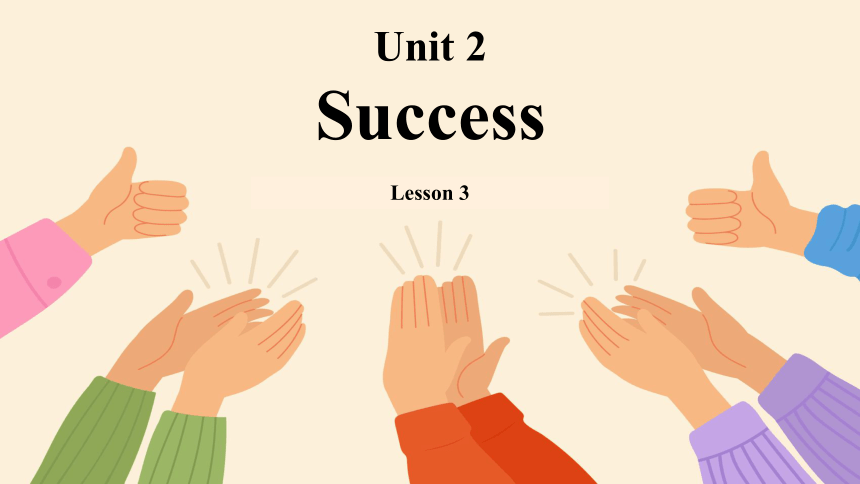 | |
| 格式 | pptx | ||
| 文件大小 | 49.8MB | ||
| 资源类型 | 教案 | ||
| 版本资源 | 北师大版(2019) | ||
| 科目 | 英语 | ||
| 更新时间 | 2025-07-31 21:25:37 | ||
图片预览

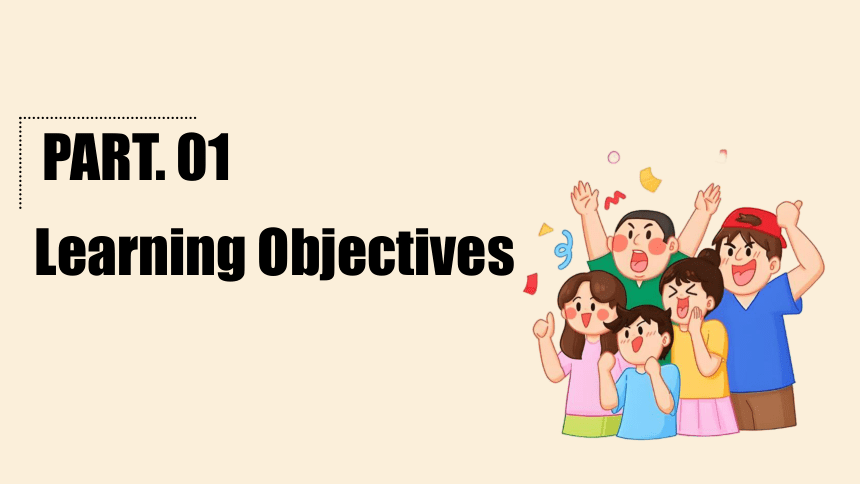
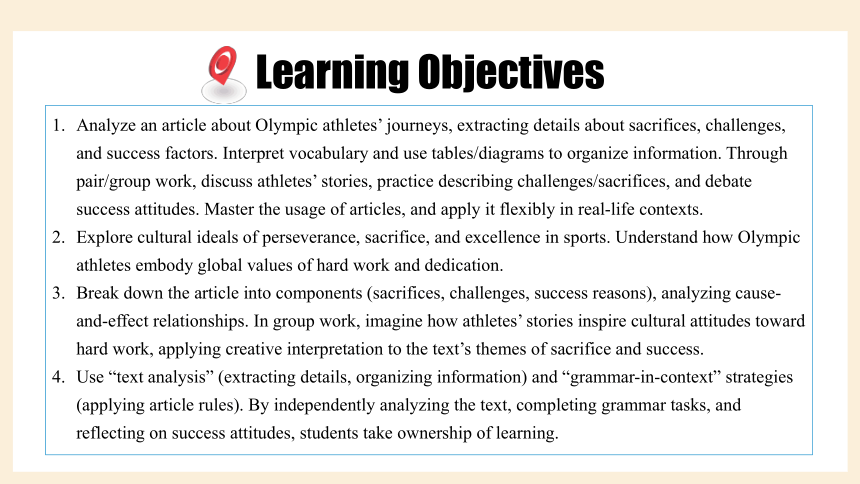
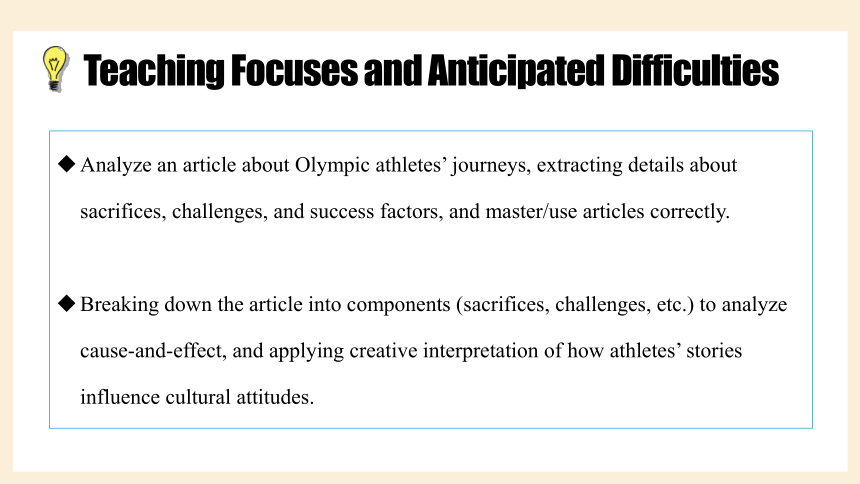
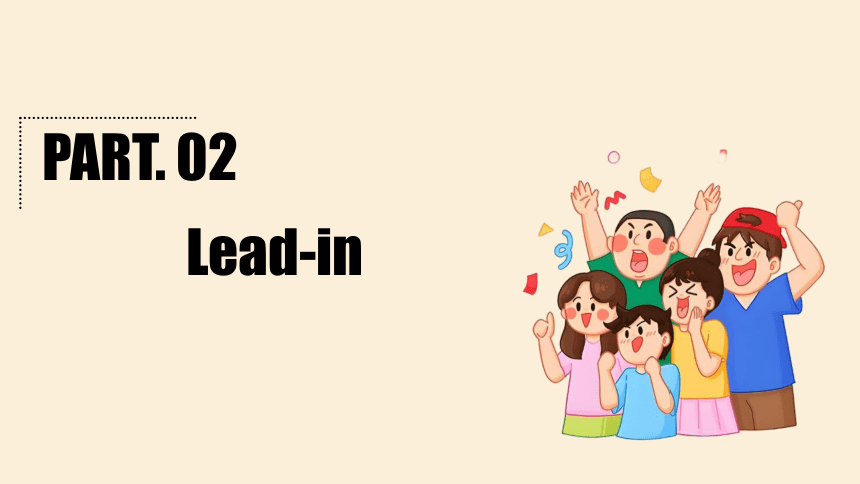
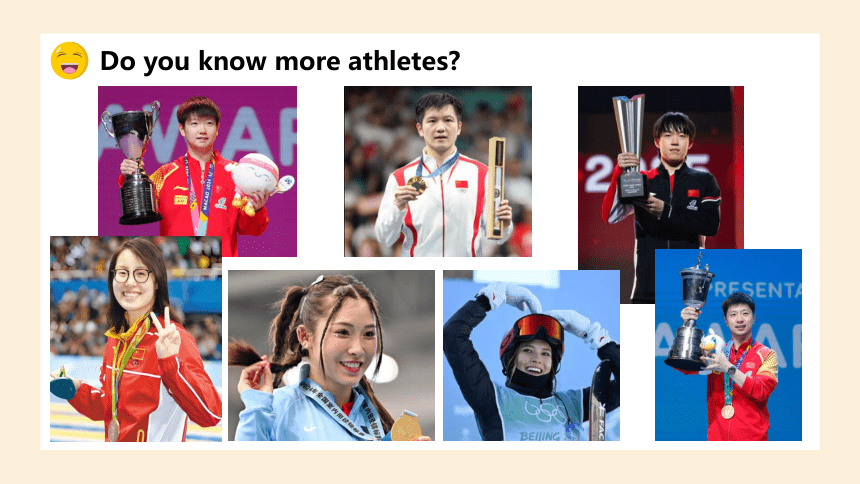
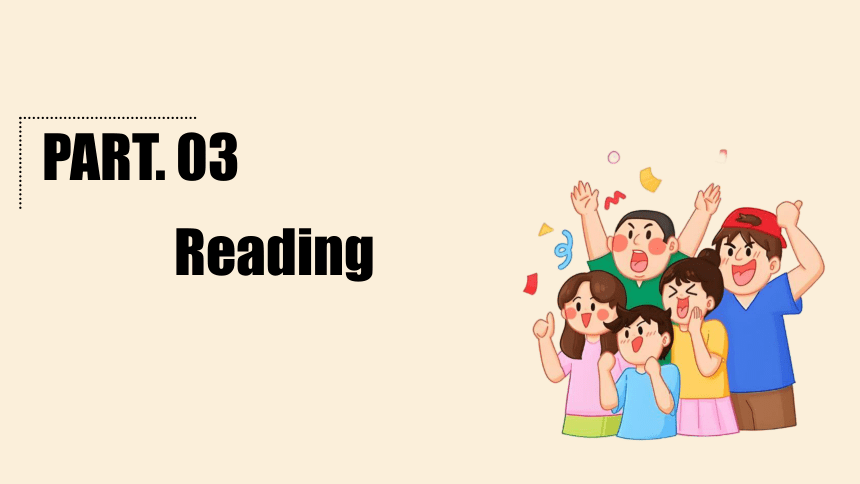
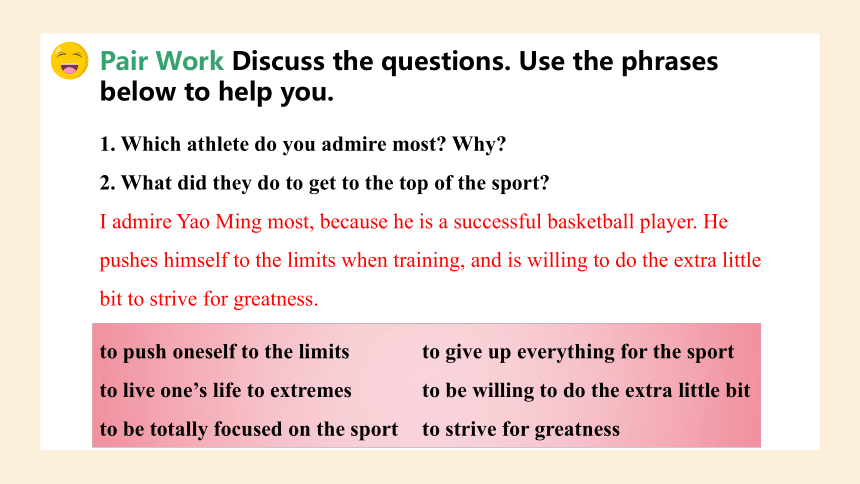
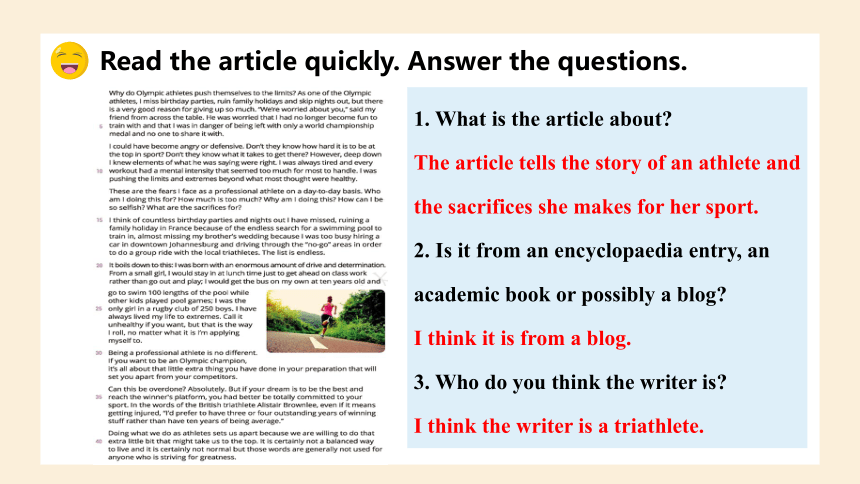
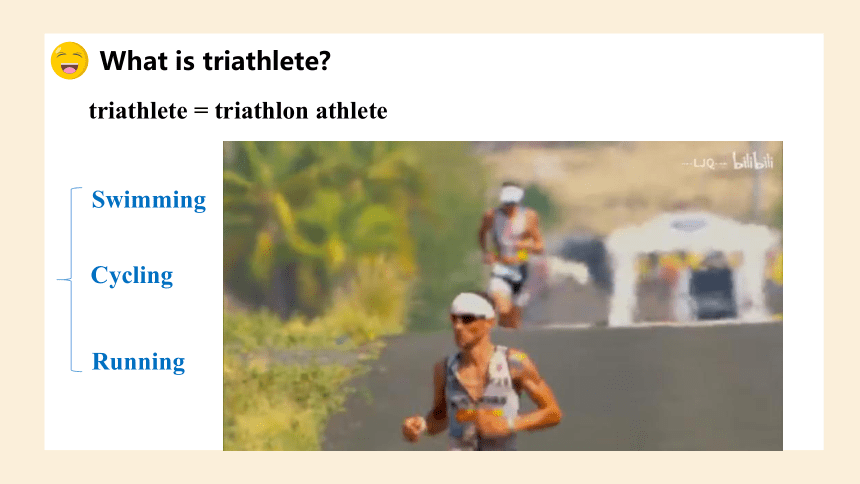
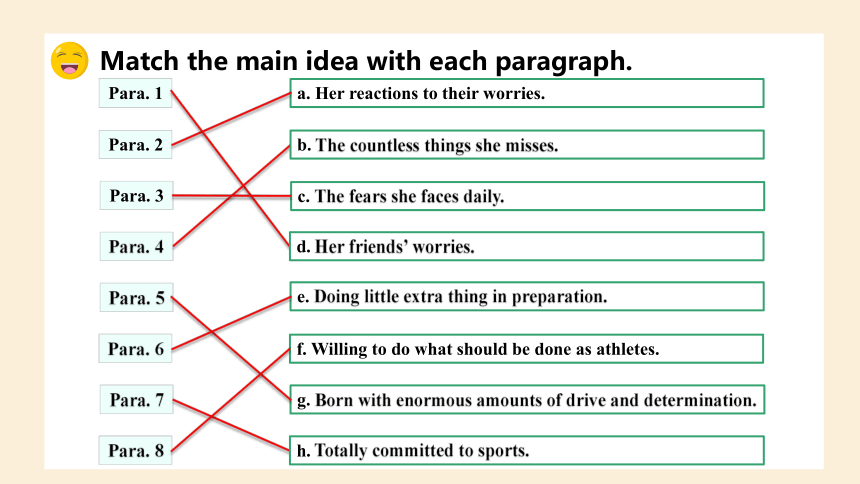
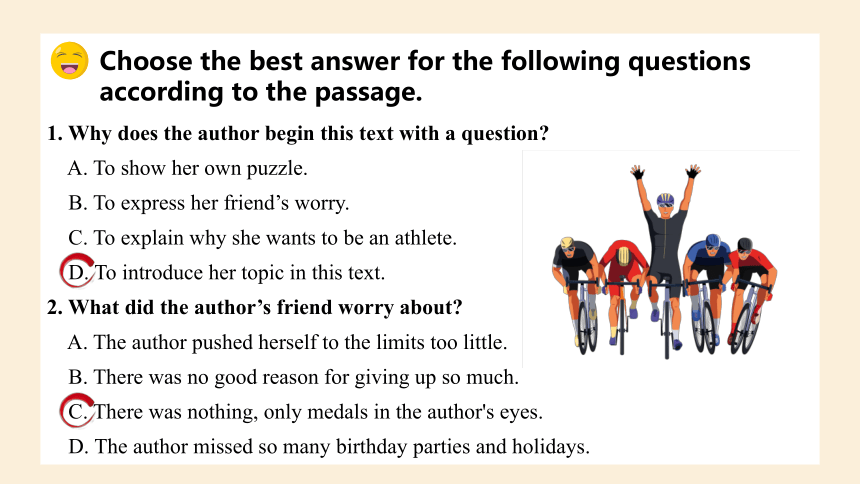
文档简介
(共56张PPT)
Unit 2
Success
Lesson 3
Learning Objectives
PART. 01
Understand the daily study and life of British middle school students by watching videos. Based on your own daily study and life, compare the study and life in Chinese and British schools, and find out the similarities and differences between the two. Talk about your first impression of high school life, and have a preliminary perception of the study and life in the senior high school stage.
Learning Objectives
Analyze an article about Olympic athletes’ journeys, extracting details about sacrifices, challenges, and success factors. Interpret vocabulary and use tables/diagrams to organize information. Through pair/group work, discuss athletes’ stories, practice describing challenges/sacrifices, and debate success attitudes. Master the usage of articles, and apply it flexibly in real-life contexts.
Explore cultural ideals of perseverance, sacrifice, and excellence in sports. Understand how Olympic athletes embody global values of hard work and dedication.
Break down the article into components (sacrifices, challenges, success reasons), analyzing cause-and-effect relationships. In group work, imagine how athletes’ stories inspire cultural attitudes toward hard work, applying creative interpretation to the text’s themes of sacrifice and success.
Use “text analysis” (extracting details, organizing information) and “grammar-in-context” strategies (applying article rules). By independently analyzing the text, completing grammar tasks, and reflecting on success attitudes, students take ownership of learning.
Understand the daily study and life of British middle school students by watching videos. Based on your own daily study and life, compare the study and life in Chinese and British schools, and find out the similarities and differences between the two. Talk about your first impression of high school life, and have a preliminary perception of the study and life in the senior high school stage.
Teaching Focuses and Anticipated Difficulties
Analyze an article about Olympic athletes’ journeys, extracting details about sacrifices, challenges, and success factors, and master/use articles correctly.
Breaking down the article into components (sacrifices, challenges, etc.) to analyze cause-and-effect, and applying creative interpretation of how athletes’ stories influence cultural attitudes.
Lead-in
PART. 02
Do you know more athletes
Reading
PART. 03
Pair Work Discuss the questions. Use the phrases below to help you.
to push oneself to the limits to give up everything for the sport
to live one’s life to extremes to be willing to do the extra little bit
to be totally focused on the sport to strive for greatness
1. Which athlete do you admire most Why
2. What did they do to get to the top of the sport
I admire Yao Ming most, because he is a successful basketball player. He pushes himself to the limits when training, and is willing to do the extra little bit to strive for greatness.
Read the article quickly. Answer the questions.
1. What is the article about
The article tells the story of an athlete and the sacrifices she makes for her sport.
2. Is it from an encyclopaedia entry, an academic book or possibly a blog
I think it is from a blog.
3. Who do you think the writer is
I think the writer is a triathlete.
What is triathlete
triathlete = triathlon athlete
Swimming
Cycling
Running
Match the main idea with each paragraph.
Para. 1
Para. 3
Para. 4
Para. 2
e. Doing little extra thing in preparation.
a. Her reactions to their worries.
f. Willing to do what should be done as athletes.
c. The fears she faces daily.
g. Born with enormous amounts of drive and determination.
Para. 5
b. The countless things she misses.
d. Her friends’ worries.
Para. 6
Para. 7
h. Totally committed to sports.
Para. 8
Choose the best answer for the following questions according to the passage.
1. Why does the author begin this text with a question
A. To show her own puzzle.
B. To express her friend’s worry.
C. To explain why she wants to be an athlete.
D. To introduce her topic in this text.
2. What did the author’s friend worry about
A. The author pushed herself to the limits too little.
B. There was no good reason for giving up so much.
C. There was nothing, only medals in the author's eyes.
D. The author missed so many birthday parties and holidays.
Choose the best answer for the following questions according to the passage.
3. How does the author think of her friend's worry
A. Reasonable. B. Aggressive.
C. Incredible. D. Thoughtful.
4. What would the author do when she was young
A. Go out and play. B. Play pool games.
C. Take buses alone. D. Take holidays often.
5. What should a professional athlete be
A. Determined. B. Worried.
C. Cheerful. D. Careful.
Choose the best answer for the following questions according to the passage.
6. What can we infer from Paragraph 3
A. The author is scared of ending her professional life.
B. The author is troubled because she trains too hard.
C. The author feels confused and unsure sometimes.
D. The author is disliked for being too selfish.
7. What drives the author to do what she is doing
A. The encouragement from her parents.
B. The strong desire to get to the top.
C. The self-control she learned as a child.
D. The unhealthy lifestyle she takes to the extreme.
Read paragraphs 1-4. Complete the information in the table. Then describe the writer's situation to your partner.
The situation the writer faces Things she gives up as an Olympic athlete
Her friends’ worries and her reactions
The fears she faces on a daily basis
Birthday parties, family holidays, nights out and so on
She will lose her friends; she knew they were right.
Whether she is pushing the limits too much; whether she is being selfish.
Answer the questions based on what you have read.
1. Did her friend understand her Why
No, he didn’t, because he was afraid that when she reached the top she would have no friends.
2. Did the writer get angry with her friend Did she try to explain Why
No, she didn’t, because she knew what her friend said was right and she was pushing the limits too hard. She didn’t try to explain because most people would not understand.
Answer the questions based on what you have read.
3. Was she clear about why she had chosen to be an athlete
How do you know
Yes, she was. From the description of her sacrifice we could know she is a “go-getter” with an enormous amount of drive and determination to be the best.
We can see that through her descriptions such as “running a family holiday because of the endless search for a swimming pool to train in”, “almost missed my brother’s wedding because I was busy hiring a car and driving through the ‘no go’ area in order to do a group ride with the local triathletes.”
Read paragraphs 5-8. Identify the reasons why the writer was able to get to the top. Use a diagram to illustrate and talk about your analysis.
get ahead on class work rather than go out and play
get the bus on her own at ten years old
go to swim 100 lengths of the pool while other kids played pool games
the only girl in a rugby club of 250 boys
Read the article. What do the phrases or sentence refer to in the article
a very good reason (line 3)
on a day-to-day basis (line 12)
The list is endless (line 19)
an enormous amount of drive and determination (line 20)
three or four outstanding years of winning stuff (line 37-38)
Read the article. What do the phrases or sentence refer to in the article
1. a very good reason (line 3)
“a very good reason” refers that “it takes a lot to be at the top”.
2. on a day-to-day basis (line 12)
“on a day-to-day basis” refers to “every day”.
Read the article. What do the phrases or sentence refer to in the article
3. The list is endless (line 19)
“The list is endless” refers to “countless birthday parties and nights out I have missed, ruining a family holiday in France because of the endless search for swimming pool to train in, almost missing my brother’s wedding because I was too busy hiring a car in downtownn Johannesburg and driving through the ‘no-go’ areas in order to do a group ride with the local triathletes.”
Read the article. What do the phrases or sentence refer to in the article
4. an enormous amount of drive and determination (line 20)
“an enormous amount of drive and determination” refers that “from a small girl, I would stay in at lunch time just to get ahead on class work rather than go out and play; I would get the bus on my own at ten years old and go to swim 100 lengths of the pool while other kids played pool games; I was the only girl in a rugby club of 250 boys. I have always lived my life to extremes.”
Read the article. What do the phrases or sentence refer to in the article
5. three or four outstanding years of winning stuff (line 37-38)
“three or four outstanding years of winning stuff” refers that “if your dream is to be the best and reach the winner’s platform, you had better be totally committed to your sport.”
Which statements do you think are true according to the article Why
Identifying Real Information
Sometimes, a task may contain questions with unreliable information or inaccurate interpretation. It is important to know how to identify what information is accurate (true) and what is inaccurate (false).
Read the text to get the general idea.
Then read the questions / statements and identify important words.
Find the relevant part of the text and identify the important words.
Decide if the important words in the questions / statements and the text express the same idea.
Skill Builder
Which statements do you think are true according to the article Why
1. The writer is a professional triathlete.
2. Her first sport was rugby.
3. At first, she was afraid to join the rugby club because it had 250 boys.
Which statements do you think are true according to the article Why
4. She missed many birthday parties, ruined family holidays and skipped nights out for the sport she devoted herself to.
Which statements do you think are true according to the article Why
5. What makes an Olympic champion stand out from other competitors is the special talent she or he has.
6. Although she knows that her way of life is unbalanced or unhealthy, she is determined to continue.
Think & share
What are the three most important reasons why the writer was able to get to the top Find evidence to support your conclusion.
The first important reason is that she was born with an enormous amount of drive and determination (in para 5).
The second important reason is that she has always lived her life to extremes, whatever it is she is applying herself to (in para 5).
The third reason is that as a professional athlete she is prepared to do that little extra in her preparation that sets her apart from her competitors (in para 6).
Think & share
What is your opinion about the writer’s attitude and commitment to the profession she has chosen
I think she will get to the top because she has so much commitment to the profession she has chosen and she is so determined to be the best.
Complete the summary using the correct form of the words and phrases below.
enormous outstanding extreme countless intensity
length selfish normal boil down to apply myself
It 1______________ this: I was born with an 2____________ amount of drive and determination. In my attempt to strive for greatness, I made 3____________ sacrifice, living my life to 4__________ where every workout had a mental 5___________ that seemed too much for most people. If you are not totally committed to your sport and want to lead a 6___________ life, you can never be a(n) 7_____________ athlete, let alone an Olympic champion. You may think it is unhealthy or 8__________ to go to these 9___________, but that is the way I roll, no matter what I'm 10_______________ to.
boils down to
enormous
countless
extremes
intensity
lengths
applying myself
normal
outstanding
selfish
Complete the sentences with definite article the or zero articles.
1. Why do Olympic athletes push themselves to ________ limits
2. I miss ________ birthday parties, ruin family holidays and skip nights out.
3. “We’re worried about you,” said my friend from across ________ table.
4. Don’t they know how hard it is to be at ________ top in sport
5. ... because I was too busy hiring a car in downtown ________ Johannesburg.
6. I was born with an enormous amount of ________ drive and determination.
7. I was ________ only girl in a rugby club of 250 boys.
8. But if your dream is to be ________ best and reach the winner's platform, you had better be totally committed to your sport.
the
/
the
the
/
/
the
the
Articles (冠词)
一、冠词的概念
冠词是一种虚词,本身不能单独使用,必须放在名词前面,以帮助说明名词所指的人或事物。冠词分为定冠词,不定冠词和零冠词。
二、冠词的用法
(一)定冠词
1. 用在表示特指的人或物的名词前。
The book on the desk is mine. 书桌上的那本书是我的。
2. 用在复数姓氏前,表示一家人或夫妇二人。
The Greens are going to move to Beijing. 格林一家要搬到北京去。
3. 用在表示世纪、年代、朝代的名词前或用在表示方位的名词前。
the Tang dynasty 唐朝
the Spring and Autumn Period 春秋时期
in the 1990’s/ 1990s 在20世纪90年代
the south 南方/ 部
4. 用在表示世界上独一无二的事物的名词前。
the sun 太阳 the moon 月亮
5. “the+形容词或分词”有时也可以表示类指。
the wounded 伤员 the deaf 耳聋的人
the rich 富人 the poor 穷人
6. 用在表示江河海洋、山脉群岛、海湾海峡等的地理名词前。
the Yangtze River 长江
the Thames 泰晤士河
the Nile 尼罗河
the Pacific 太平洋
7. 用在序数词或形容词、副词的最高级前。
He is the better of the two. 他是两者中较好的那个。
He was the first to speak against slavery. 他是第一个发表演说反对奴隶制的人。
8. 用在西方乐器前。
play the piano 弹钢琴 play the violin 拉小提琴
(二)不定冠词
1. 用在第一次提到的人或物前,表泛指。
At that time, I was working in a factory. The factory produces car parts.
那时,我在一家工厂工作。那家工厂生产各种汽车部件。
2. 用于固定短语中。
a variety of, have a gift for, give sb a ride, a couple of, have a good time, keep a diary, in a hurry, once in a while, at a loss, tell a lie, do sb a favour
3. 用于数量、时间等名词前,表示“每一(单位)的……,相当于per。
I earned ten dollars an hour as a supermarket cashier on Saturdays.
我周六在超市当收银员,每小时赚10美元。
(三)零冠词
1. 专有名词、物质名词、抽象名词、人名、地名等名词前,一般不加冠词,如:China、America、Smith。
2. 可数名词前有物主代词、指示代词、名词所有格等修饰时,不加冠词。
This dictionary is mine. 这个词典是我的。
3. 季节、月份、星期、一日三餐等名称前一般不加冠词。如:Autumn, May, Saturday.
4. 称呼语或指家里雇用的 nurse、cook 等名词前及表示头衔职务的名词作宾语、补语及同位语时,一般不加冠词。
We made him our chairman. 我们选他为我们的主席。
5. 学科名称、球类、棋类名称前,不加冠词。
Do you study physics 你学物理吗?
He likes playing football/chess. 他喜欢踢足球/下棋。
6. 复数名词用于泛指一类人或事物时,其前面不用冠词。
They are peasants / workers. 他们是农民/工人。
7. 在与by连用的交通工具名称前,不加冠词,如:by car, by bus, by bike。
8. as 引导的让步状语从句中,作表语的名词不带冠词。
Child as he is, he knows a lot.
虽然他是个孩子,但是懂得很多
Find examples for the rules about definite article the and zero articles from the sentences in Activity 10.
We use the definite article the:
when there is only one of something (e.g. the top).
when we refer to something unique (e.g. ________________).
for superlatives (e.g. ________________).
for known things that do not need to be introduced or explained (e.g. ________________).
for certain idioms (e.g. ___________________________).
the only girl
the best
the sacrifices
across the table, put the limit
Find examples for the rules about definite article the and zero articles from the sentences in Activity 10.
We use the zero article:
with proper nouns, i.e. the names of people and places (e.g. ________________).
with plural countable nouns referring to things in general (e.g. ________________).
with uncountable nouns referring to something in general (e.g. ________________).
Johannesburg
birthday parties
drive
Complete the sentences with "the" or "/".
How far is it from _________ capital city
Did you see _________ last episode of Heroes
I’ve bought a new phone. _________ phone’s got a fantastic camera.
Who is _________ best singer at the moment
All children should do _________ sports when they are at _________ school.
Is that _________ house where you grew up
the
the
The
the
/
/
the
Group Work. Choose the four most important things you need to get to the top. Then rank your choices from 1 (most important) to 4 (least important). Share your list with the other group members. Give reasons for your choices.
intelligence
determination
patience
mental toughness
concentration
self-discipline
Vocabulary
1. strive
strive for 争取,奋斗
strive after 奋斗;争取
strive against 反抗
例题:
The community has been strive ________ pollution for years, and now the river in their town is much cleaner.
against
Vocabulary
2. ruin
in ruins 严重受损;破败不堪
fall into ruin 成为废墟
bring sb. to ruin 使某人失败;使倾家荡产
ruin oneself 自取灭亡
例题:
After the earthquake, the small village was left in _______(ruin), with houses collapsed and roads blocked by fallen trees.
ruins
Vocabulary
3. skip
skip off/out 溜走;突然离去
skip out on sb 离开;溜走
skip over sth 跳读;略过
例题:
He tried to skip _______ the embarrassing part of his story, but his friends kept asking questions until he finally told the whole truth.
over
Vocabulary
4. sacrifice
sacrifice for 为……而牺牲
at the sacrifice of 以牺牲……为代价
make a sacrifice for 为……作出牺牲
例题:
Many firefighters sacrifice their lives ______ protecting people during emergencies.
for
Vocabulary
5. hire
hire sth. out 把某物租出去
hire oneself out (to sb.) 接受(某人的)临时聘用
hire sb. 临时聘用某人
hire sb. to do sth 雇佣某人做某事
例题:
They hired a photographer ________(take) pictures at their wedding, wanting to capture every special moment with professional quality.
to take
Vocabulary
6. apart
set sb/sth apart 使与众不同
apart from... 除……之外
take apart 拆开
come/fall apart 破碎;奔溃
tell ... apart 区分;辨别
例题:
Apart ______ a small garden at the back, the house has no outdoor space.
from
Vocabulary
7. average
an average of 平均为
on average 平均起来
例题:
Doctors recommend that teenagers get an average _____ eight to nine hours of sleep every night to stay focused in school.
of
Exercise
PART. 04
1. Her o__________(杰出的) performance in the math competition earned her a scholarship to the top university, where she plans to study computer science.
2. The scientist made an e__________(巨大的) discovery that changed how we understand the universe.
3. The i________(强度) of the sun at noon made it hard to see, so we put on sunglasses and looked for a shady spot to rest.
4. Humor was a surprising e________(要素) in her speech, making the serious topic more engaging and easier to understand.
utstanding
Exercise: 单词拼写
normous
ntensity
lement
1. Looking up at the night sky, we saw __________(count) stars shining brightly, making the dark canvas above look like a sea of light.
2. The country built __________(defend) walls along its border to protect against possible attacks from neighboring regions.
3. The professor’s new book focuses on ___________(academy) research into climate change, analyzing data from over 50 scientific studies.
4. The store _________(normal) has fresh bread every morning, but today they sold out early.
countless
Exercise: 用所给词的适当形式填空
defensive
academic
normally
Summary
PART. 05
添加标题
ADD THE TITLE HERE
Lesson 3
Vocabulary
analyze Olympic athletes’ journeys, extracting details about sacrifices, challenges, and success factors
discuss athletes’ stories, practice describing challenges / sacrifices
Reading
strive, ruin, skip, sacrifice, hire, apart, average
冠词
概念
用法
定冠词
不定冠词
零冠词
Homework
PART. 06
Do you think the sacrifices the writer describes are worth it Why or why not
Homework
See you next class!
Unit 2
Success
Lesson 3
Learning Objectives
PART. 01
Understand the daily study and life of British middle school students by watching videos. Based on your own daily study and life, compare the study and life in Chinese and British schools, and find out the similarities and differences between the two. Talk about your first impression of high school life, and have a preliminary perception of the study and life in the senior high school stage.
Learning Objectives
Analyze an article about Olympic athletes’ journeys, extracting details about sacrifices, challenges, and success factors. Interpret vocabulary and use tables/diagrams to organize information. Through pair/group work, discuss athletes’ stories, practice describing challenges/sacrifices, and debate success attitudes. Master the usage of articles, and apply it flexibly in real-life contexts.
Explore cultural ideals of perseverance, sacrifice, and excellence in sports. Understand how Olympic athletes embody global values of hard work and dedication.
Break down the article into components (sacrifices, challenges, success reasons), analyzing cause-and-effect relationships. In group work, imagine how athletes’ stories inspire cultural attitudes toward hard work, applying creative interpretation to the text’s themes of sacrifice and success.
Use “text analysis” (extracting details, organizing information) and “grammar-in-context” strategies (applying article rules). By independently analyzing the text, completing grammar tasks, and reflecting on success attitudes, students take ownership of learning.
Understand the daily study and life of British middle school students by watching videos. Based on your own daily study and life, compare the study and life in Chinese and British schools, and find out the similarities and differences between the two. Talk about your first impression of high school life, and have a preliminary perception of the study and life in the senior high school stage.
Teaching Focuses and Anticipated Difficulties
Analyze an article about Olympic athletes’ journeys, extracting details about sacrifices, challenges, and success factors, and master/use articles correctly.
Breaking down the article into components (sacrifices, challenges, etc.) to analyze cause-and-effect, and applying creative interpretation of how athletes’ stories influence cultural attitudes.
Lead-in
PART. 02
Do you know more athletes
Reading
PART. 03
Pair Work Discuss the questions. Use the phrases below to help you.
to push oneself to the limits to give up everything for the sport
to live one’s life to extremes to be willing to do the extra little bit
to be totally focused on the sport to strive for greatness
1. Which athlete do you admire most Why
2. What did they do to get to the top of the sport
I admire Yao Ming most, because he is a successful basketball player. He pushes himself to the limits when training, and is willing to do the extra little bit to strive for greatness.
Read the article quickly. Answer the questions.
1. What is the article about
The article tells the story of an athlete and the sacrifices she makes for her sport.
2. Is it from an encyclopaedia entry, an academic book or possibly a blog
I think it is from a blog.
3. Who do you think the writer is
I think the writer is a triathlete.
What is triathlete
triathlete = triathlon athlete
Swimming
Cycling
Running
Match the main idea with each paragraph.
Para. 1
Para. 3
Para. 4
Para. 2
e. Doing little extra thing in preparation.
a. Her reactions to their worries.
f. Willing to do what should be done as athletes.
c. The fears she faces daily.
g. Born with enormous amounts of drive and determination.
Para. 5
b. The countless things she misses.
d. Her friends’ worries.
Para. 6
Para. 7
h. Totally committed to sports.
Para. 8
Choose the best answer for the following questions according to the passage.
1. Why does the author begin this text with a question
A. To show her own puzzle.
B. To express her friend’s worry.
C. To explain why she wants to be an athlete.
D. To introduce her topic in this text.
2. What did the author’s friend worry about
A. The author pushed herself to the limits too little.
B. There was no good reason for giving up so much.
C. There was nothing, only medals in the author's eyes.
D. The author missed so many birthday parties and holidays.
Choose the best answer for the following questions according to the passage.
3. How does the author think of her friend's worry
A. Reasonable. B. Aggressive.
C. Incredible. D. Thoughtful.
4. What would the author do when she was young
A. Go out and play. B. Play pool games.
C. Take buses alone. D. Take holidays often.
5. What should a professional athlete be
A. Determined. B. Worried.
C. Cheerful. D. Careful.
Choose the best answer for the following questions according to the passage.
6. What can we infer from Paragraph 3
A. The author is scared of ending her professional life.
B. The author is troubled because she trains too hard.
C. The author feels confused and unsure sometimes.
D. The author is disliked for being too selfish.
7. What drives the author to do what she is doing
A. The encouragement from her parents.
B. The strong desire to get to the top.
C. The self-control she learned as a child.
D. The unhealthy lifestyle she takes to the extreme.
Read paragraphs 1-4. Complete the information in the table. Then describe the writer's situation to your partner.
The situation the writer faces Things she gives up as an Olympic athlete
Her friends’ worries and her reactions
The fears she faces on a daily basis
Birthday parties, family holidays, nights out and so on
She will lose her friends; she knew they were right.
Whether she is pushing the limits too much; whether she is being selfish.
Answer the questions based on what you have read.
1. Did her friend understand her Why
No, he didn’t, because he was afraid that when she reached the top she would have no friends.
2. Did the writer get angry with her friend Did she try to explain Why
No, she didn’t, because she knew what her friend said was right and she was pushing the limits too hard. She didn’t try to explain because most people would not understand.
Answer the questions based on what you have read.
3. Was she clear about why she had chosen to be an athlete
How do you know
Yes, she was. From the description of her sacrifice we could know she is a “go-getter” with an enormous amount of drive and determination to be the best.
We can see that through her descriptions such as “running a family holiday because of the endless search for a swimming pool to train in”, “almost missed my brother’s wedding because I was busy hiring a car and driving through the ‘no go’ area in order to do a group ride with the local triathletes.”
Read paragraphs 5-8. Identify the reasons why the writer was able to get to the top. Use a diagram to illustrate and talk about your analysis.
get ahead on class work rather than go out and play
get the bus on her own at ten years old
go to swim 100 lengths of the pool while other kids played pool games
the only girl in a rugby club of 250 boys
Read the article. What do the phrases or sentence refer to in the article
a very good reason (line 3)
on a day-to-day basis (line 12)
The list is endless (line 19)
an enormous amount of drive and determination (line 20)
three or four outstanding years of winning stuff (line 37-38)
Read the article. What do the phrases or sentence refer to in the article
1. a very good reason (line 3)
“a very good reason” refers that “it takes a lot to be at the top”.
2. on a day-to-day basis (line 12)
“on a day-to-day basis” refers to “every day”.
Read the article. What do the phrases or sentence refer to in the article
3. The list is endless (line 19)
“The list is endless” refers to “countless birthday parties and nights out I have missed, ruining a family holiday in France because of the endless search for swimming pool to train in, almost missing my brother’s wedding because I was too busy hiring a car in downtownn Johannesburg and driving through the ‘no-go’ areas in order to do a group ride with the local triathletes.”
Read the article. What do the phrases or sentence refer to in the article
4. an enormous amount of drive and determination (line 20)
“an enormous amount of drive and determination” refers that “from a small girl, I would stay in at lunch time just to get ahead on class work rather than go out and play; I would get the bus on my own at ten years old and go to swim 100 lengths of the pool while other kids played pool games; I was the only girl in a rugby club of 250 boys. I have always lived my life to extremes.”
Read the article. What do the phrases or sentence refer to in the article
5. three or four outstanding years of winning stuff (line 37-38)
“three or four outstanding years of winning stuff” refers that “if your dream is to be the best and reach the winner’s platform, you had better be totally committed to your sport.”
Which statements do you think are true according to the article Why
Identifying Real Information
Sometimes, a task may contain questions with unreliable information or inaccurate interpretation. It is important to know how to identify what information is accurate (true) and what is inaccurate (false).
Read the text to get the general idea.
Then read the questions / statements and identify important words.
Find the relevant part of the text and identify the important words.
Decide if the important words in the questions / statements and the text express the same idea.
Skill Builder
Which statements do you think are true according to the article Why
1. The writer is a professional triathlete.
2. Her first sport was rugby.
3. At first, she was afraid to join the rugby club because it had 250 boys.
Which statements do you think are true according to the article Why
4. She missed many birthday parties, ruined family holidays and skipped nights out for the sport she devoted herself to.
Which statements do you think are true according to the article Why
5. What makes an Olympic champion stand out from other competitors is the special talent she or he has.
6. Although she knows that her way of life is unbalanced or unhealthy, she is determined to continue.
Think & share
What are the three most important reasons why the writer was able to get to the top Find evidence to support your conclusion.
The first important reason is that she was born with an enormous amount of drive and determination (in para 5).
The second important reason is that she has always lived her life to extremes, whatever it is she is applying herself to (in para 5).
The third reason is that as a professional athlete she is prepared to do that little extra in her preparation that sets her apart from her competitors (in para 6).
Think & share
What is your opinion about the writer’s attitude and commitment to the profession she has chosen
I think she will get to the top because she has so much commitment to the profession she has chosen and she is so determined to be the best.
Complete the summary using the correct form of the words and phrases below.
enormous outstanding extreme countless intensity
length selfish normal boil down to apply myself
It 1______________ this: I was born with an 2____________ amount of drive and determination. In my attempt to strive for greatness, I made 3____________ sacrifice, living my life to 4__________ where every workout had a mental 5___________ that seemed too much for most people. If you are not totally committed to your sport and want to lead a 6___________ life, you can never be a(n) 7_____________ athlete, let alone an Olympic champion. You may think it is unhealthy or 8__________ to go to these 9___________, but that is the way I roll, no matter what I'm 10_______________ to.
boils down to
enormous
countless
extremes
intensity
lengths
applying myself
normal
outstanding
selfish
Complete the sentences with definite article the or zero articles.
1. Why do Olympic athletes push themselves to ________ limits
2. I miss ________ birthday parties, ruin family holidays and skip nights out.
3. “We’re worried about you,” said my friend from across ________ table.
4. Don’t they know how hard it is to be at ________ top in sport
5. ... because I was too busy hiring a car in downtown ________ Johannesburg.
6. I was born with an enormous amount of ________ drive and determination.
7. I was ________ only girl in a rugby club of 250 boys.
8. But if your dream is to be ________ best and reach the winner's platform, you had better be totally committed to your sport.
the
/
the
the
/
/
the
the
Articles (冠词)
一、冠词的概念
冠词是一种虚词,本身不能单独使用,必须放在名词前面,以帮助说明名词所指的人或事物。冠词分为定冠词,不定冠词和零冠词。
二、冠词的用法
(一)定冠词
1. 用在表示特指的人或物的名词前。
The book on the desk is mine. 书桌上的那本书是我的。
2. 用在复数姓氏前,表示一家人或夫妇二人。
The Greens are going to move to Beijing. 格林一家要搬到北京去。
3. 用在表示世纪、年代、朝代的名词前或用在表示方位的名词前。
the Tang dynasty 唐朝
the Spring and Autumn Period 春秋时期
in the 1990’s/ 1990s 在20世纪90年代
the south 南方/ 部
4. 用在表示世界上独一无二的事物的名词前。
the sun 太阳 the moon 月亮
5. “the+形容词或分词”有时也可以表示类指。
the wounded 伤员 the deaf 耳聋的人
the rich 富人 the poor 穷人
6. 用在表示江河海洋、山脉群岛、海湾海峡等的地理名词前。
the Yangtze River 长江
the Thames 泰晤士河
the Nile 尼罗河
the Pacific 太平洋
7. 用在序数词或形容词、副词的最高级前。
He is the better of the two. 他是两者中较好的那个。
He was the first to speak against slavery. 他是第一个发表演说反对奴隶制的人。
8. 用在西方乐器前。
play the piano 弹钢琴 play the violin 拉小提琴
(二)不定冠词
1. 用在第一次提到的人或物前,表泛指。
At that time, I was working in a factory. The factory produces car parts.
那时,我在一家工厂工作。那家工厂生产各种汽车部件。
2. 用于固定短语中。
a variety of, have a gift for, give sb a ride, a couple of, have a good time, keep a diary, in a hurry, once in a while, at a loss, tell a lie, do sb a favour
3. 用于数量、时间等名词前,表示“每一(单位)的……,相当于per。
I earned ten dollars an hour as a supermarket cashier on Saturdays.
我周六在超市当收银员,每小时赚10美元。
(三)零冠词
1. 专有名词、物质名词、抽象名词、人名、地名等名词前,一般不加冠词,如:China、America、Smith。
2. 可数名词前有物主代词、指示代词、名词所有格等修饰时,不加冠词。
This dictionary is mine. 这个词典是我的。
3. 季节、月份、星期、一日三餐等名称前一般不加冠词。如:Autumn, May, Saturday.
4. 称呼语或指家里雇用的 nurse、cook 等名词前及表示头衔职务的名词作宾语、补语及同位语时,一般不加冠词。
We made him our chairman. 我们选他为我们的主席。
5. 学科名称、球类、棋类名称前,不加冠词。
Do you study physics 你学物理吗?
He likes playing football/chess. 他喜欢踢足球/下棋。
6. 复数名词用于泛指一类人或事物时,其前面不用冠词。
They are peasants / workers. 他们是农民/工人。
7. 在与by连用的交通工具名称前,不加冠词,如:by car, by bus, by bike。
8. as 引导的让步状语从句中,作表语的名词不带冠词。
Child as he is, he knows a lot.
虽然他是个孩子,但是懂得很多
Find examples for the rules about definite article the and zero articles from the sentences in Activity 10.
We use the definite article the:
when there is only one of something (e.g. the top).
when we refer to something unique (e.g. ________________).
for superlatives (e.g. ________________).
for known things that do not need to be introduced or explained (e.g. ________________).
for certain idioms (e.g. ___________________________).
the only girl
the best
the sacrifices
across the table, put the limit
Find examples for the rules about definite article the and zero articles from the sentences in Activity 10.
We use the zero article:
with proper nouns, i.e. the names of people and places (e.g. ________________).
with plural countable nouns referring to things in general (e.g. ________________).
with uncountable nouns referring to something in general (e.g. ________________).
Johannesburg
birthday parties
drive
Complete the sentences with "the" or "/".
How far is it from _________ capital city
Did you see _________ last episode of Heroes
I’ve bought a new phone. _________ phone’s got a fantastic camera.
Who is _________ best singer at the moment
All children should do _________ sports when they are at _________ school.
Is that _________ house where you grew up
the
the
The
the
/
/
the
Group Work. Choose the four most important things you need to get to the top. Then rank your choices from 1 (most important) to 4 (least important). Share your list with the other group members. Give reasons for your choices.
intelligence
determination
patience
mental toughness
concentration
self-discipline
Vocabulary
1. strive
strive for 争取,奋斗
strive after 奋斗;争取
strive against 反抗
例题:
The community has been strive ________ pollution for years, and now the river in their town is much cleaner.
against
Vocabulary
2. ruin
in ruins 严重受损;破败不堪
fall into ruin 成为废墟
bring sb. to ruin 使某人失败;使倾家荡产
ruin oneself 自取灭亡
例题:
After the earthquake, the small village was left in _______(ruin), with houses collapsed and roads blocked by fallen trees.
ruins
Vocabulary
3. skip
skip off/out 溜走;突然离去
skip out on sb 离开;溜走
skip over sth 跳读;略过
例题:
He tried to skip _______ the embarrassing part of his story, but his friends kept asking questions until he finally told the whole truth.
over
Vocabulary
4. sacrifice
sacrifice for 为……而牺牲
at the sacrifice of 以牺牲……为代价
make a sacrifice for 为……作出牺牲
例题:
Many firefighters sacrifice their lives ______ protecting people during emergencies.
for
Vocabulary
5. hire
hire sth. out 把某物租出去
hire oneself out (to sb.) 接受(某人的)临时聘用
hire sb. 临时聘用某人
hire sb. to do sth 雇佣某人做某事
例题:
They hired a photographer ________(take) pictures at their wedding, wanting to capture every special moment with professional quality.
to take
Vocabulary
6. apart
set sb/sth apart 使与众不同
apart from... 除……之外
take apart 拆开
come/fall apart 破碎;奔溃
tell ... apart 区分;辨别
例题:
Apart ______ a small garden at the back, the house has no outdoor space.
from
Vocabulary
7. average
an average of 平均为
on average 平均起来
例题:
Doctors recommend that teenagers get an average _____ eight to nine hours of sleep every night to stay focused in school.
of
Exercise
PART. 04
1. Her o__________(杰出的) performance in the math competition earned her a scholarship to the top university, where she plans to study computer science.
2. The scientist made an e__________(巨大的) discovery that changed how we understand the universe.
3. The i________(强度) of the sun at noon made it hard to see, so we put on sunglasses and looked for a shady spot to rest.
4. Humor was a surprising e________(要素) in her speech, making the serious topic more engaging and easier to understand.
utstanding
Exercise: 单词拼写
normous
ntensity
lement
1. Looking up at the night sky, we saw __________(count) stars shining brightly, making the dark canvas above look like a sea of light.
2. The country built __________(defend) walls along its border to protect against possible attacks from neighboring regions.
3. The professor’s new book focuses on ___________(academy) research into climate change, analyzing data from over 50 scientific studies.
4. The store _________(normal) has fresh bread every morning, but today they sold out early.
countless
Exercise: 用所给词的适当形式填空
defensive
academic
normally
Summary
PART. 05
添加标题
ADD THE TITLE HERE
Lesson 3
Vocabulary
analyze Olympic athletes’ journeys, extracting details about sacrifices, challenges, and success factors
discuss athletes’ stories, practice describing challenges / sacrifices
Reading
strive, ruin, skip, sacrifice, hire, apart, average
冠词
概念
用法
定冠词
不定冠词
零冠词
Homework
PART. 06
Do you think the sacrifices the writer describes are worth it Why or why not
Homework
See you next class!
同课章节目录
- Unit 1 Relationshis
- Lesson 1 Teachers
- Lesson 2 How Do We Like Teachers’ Feedback?
- Lesson 3 So Close,Yet So Fa
- Unit 2 Success
- Lesson 1 Money vs Success
- Lesson 2 Top Five Secrets of Success
- Lesson 3 Getting to the Top
- Unit 3 Conservation
- Lesson 1 The Sixth Extinction
- Lesson 2 War on Plastic Packets
- Lesson 3 The Road to Destruction
